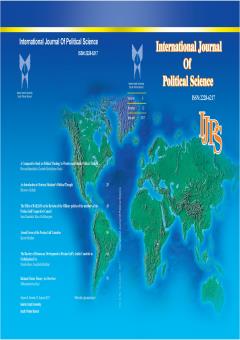Pathology of the Islamic Revolution from the point of view of Martyr Motahari and Strategies to deal with them
Subject Areas :Neda Nabavi Tabatabaei 1 , Ahmad Bakhshayesh Ardestani 2 * , Mohammad Ali Khosravi 3
1 - Department of Political Science, Central Tehran Branch, Islamic Azad University, Tehran, Iran
2 - Department of Political Science, Central Tehran Branch, Islamic Azad University, Tehran, Iran
3 - Department of Political Science, Central Tehran Branch, Islamic Azad University, Tehran, Iran
Keywords: Vulnerability analysis, Islamic Revolution, Martyr Motahari,
Abstract :
Revolutions, as living and dynamic entities, like other political and social phenomena, are exposed to threats and challenges. Preserving and sustaining a revolution is more difficult than achieving victory in one. Therefore, maintaining the achievements and realizing the goals of the Islamic Revo-lution requires identifying the vulnerabilities that can weaken it. Given the importance of analyzing the vulnerabilities of the Islamic Revolution for its preservation and continuation, this research aims to revisit the views of Martyr Motahari on the vulnerabilities of the Islamic Revolution and the strategies to counter these threats. This study, utilizing a descriptive-analytical research method and through document analysis of articles and books, along with notes from written sources, addresses the main question of this paper: What is Martyr Motahari’s perspective on the challenges facing the Islamic Revolution that hinder the realization of its final objectives and its continuation? The re-sults from the analysis of the collected data show that, according to Martyr Motahari, the most im-portant factor in the victory of the Islamic Revolution was the connection between what “is” and what “ought to be”, based on the teachings of Islam. The greatest threats to the Islamic Revolution, he believed, are drifting away from Islam, forgetting its objectives, principles, and Islamic values. In this context, threats such as ideological deviations, transformation, hypocrisy, dogmatism, and in-justice are highlighted. Martyr Motahari’s strategy for preserving and sustaining the Islamic Revolu-tion, and his solutions to counter these challenges, lies in reviving religious thought and applying Islamic teachings in both knowledge and practice. Additionally, maintaining and realizing inde-pendence, freedom, spirituality, and justice are crucial in this regard.
Holy Quran
Ali ibn Abi Talib (1998). Nahj al-Balaghah, Letter 31, translated by Seyyed Alinaghi Fayz al-Islam, Tehran: Fayz al-Islam Publications.
Amid Zanjani, Abbas Ali (2005). Founda-tions of Public Law in Islam, Vol. 7, Tehran: Amir Kabir Publications.
Arianpour Kashani, Manouchehr, and Abbas (1999). English-Persian Dictionary, Vol. 2, Tehran: Amir Kabir Publica-tions.
Constitution of the Islamic Republic of Iran (2018). Tehran: Research Institute of the Guardian Council, compiled by Mohammad Fathi and Kazem Kouhi Esfahani.
Eyvazi, Mohammad Rahim, and Herati, Ab-dul Wahab (2017). Analytical Intro-duction to the Islamic Revolution, Tehran: Ma'aref Publications.
Ghazi Zadeh, Kazem (1998). Juridical and Political Thoughts of Imam Kho-meini, Tehran: Strategic Research Center Publications.
Hashemi Golpayegani, Mohammad Saleh (2015). Awakening Islamic Text-book, Tehran: Binesh Motahar Pub-lications.
Hashemi Golpayegani, Mohammad Saleh (2018). Textbook on Promotion of Good and Prohibition of Evil, Teh-ran: Binesh Motahar Publications.
Jahromi, Mehdi (1999). Religious Pathology, Tehran: Hamahang Publications.
Javan Arasteh, Hossein (2005). Social and Political Rights in Islam, Tehran: Ma'aref Publications.
Malakutian, Mostafa (2018). The Islamic Revolution: Occurrence, Conse-quences, and Solutions for the Fu-ture, Qom: Ma'aref Publications.
Mohammadi, Manouchehr (2012). The Is-lamic Revolution in Comparison with the French and Russian Revo-lutions, Tehran: Ma'aref Publishing Office.
Motahari, Morteza (1988). Philosophy of Ethics, Tehran: Sadra Publications.
Motahari, Morteza (1989). Concerning the Islamic Revolution, Tehran: Sadra Publications.
Motahari, Morteza (1995). A Brief Study of Islamic Movements in the Last Cen-tury, Qom: Sadra Publications.
Motahari, Morteza (1998). Collection of Works, Vol. 1, Divine Justice, Teh-ran: Sadra Publications.
Motahari, Morteza (2007). A Study of Islam-ic Movements in the Last Century, Tehran: Sadra Publications.
Motahari, Morteza (2007). Collection of Works, No. 14, Mutual Services of Islam and Iran, Tehran: Sadra Publi-cations.
Motahari, Morteza (2007). Education and Training in Islam, Tehran: Sadra Publications.
Motahari, Morteza (2007). Education and Training in Islam, Tehran: Sadra Publications.
Motahari, Morteza (2011). Spiritual Free-dom, Tehran: Sadra Publications.
Motahari, Morteza (2012). The Future of the Islamic Revolution of Iran, Tehran: Sadra Publications.
Motahari, Morteza (2021). Promotion of Good and Prohibition of Evil, Teh-ran: Binesh Motahar Publications.
Nabavi Tabatabai, Neda (2009). Articles of the National Conference on Respon-sible Citizenship, Khurasgan: Islam-ic Azad University, Khurasgan Branch.
Nabavi Tabatabai, Neda (2017). The Role and Position of Political Freedoms in Citizen Rights, Tehran: Ostad Shah-riar Publications.
Najafi, Mousa (1996). Political Reflections in the History of Islamic Thought, Vol. 2, Tehran: Research Institute of Humanities and Cultural Studies.
Nasiri, Mohammad, et al., (2015). Analytical Approach to the Political-Theological Will of Imam Ruhollah, Tehran: Islamic Azad University Publications.
Office for Cooperation between Seminary and University (1997). Introduction to Islamic Law, Tehran: Samt Publi-cations.
Pirhadi, Mojtaba (2011). The Master in the Words of Leader Ayatollah Khame-nei, Tehran: Sadra Publications.
Rafiei, Hamzeh Ali, and Garineh Keshishian Siraki (2017). Iranian Identity in the Political Thought of Morteza Motahari, Tehran: Islamic Azad University, South Tehran Branch.
Roustai, Javid, et al. (2002). Reinterpretation of Motahari’s Thoughts, Tehran: Ma'aref Publishing Office.
Sadr al-Motalehin (2005). Describing Usul al-Kafi, translated by Mohammad Khajavi, Tehran: Institute for Cul-tural Studies and Research.
Siyapoosh, Amir, and Shafi'i Far (2022). Is-lamic Revolution: Contexts, Achievements, and Problems, Teh-ran: Ma'aref Publications.

